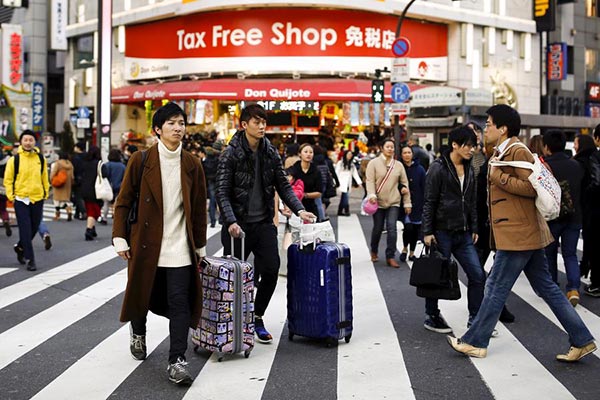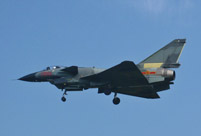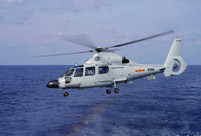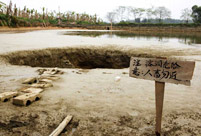


People cross a street outside a tax free department store popular among Chinese tourists in Tokyo, Japan, February 11, 2016.[Photo/Agencies]
The new tax on imported goods purchased from e-commerce sites will not affect Chinese travelers who buy abroad, the Ministry of Finance said on Saturday.
Shoppers had expressed concern that a new tax on foreign products, which went into effect on Friday, would spell trouble for outbound tourists. However, the ministry said the fears stemmed from confusion.
"The new policy targets e-commerce, not individual outbound tourists," People's Daily quoted an unidentified ministry official as saying.
According to the authority, the rules for tourists returning from abroad remain unchanged, with purchases up to the value of 5,000 yuan ($770) exempt from duties. The new tax relates only to e-commerce platforms that allow consumers to order imported goods online to be delivered through postal services.
The policy is aimed at creating a "level playing field" for cross-border e-commerce sites and brick-and-mortar stores that sell imported goods. It means overseas retail goods bought online are no longer treated as personal postal articles but as imported goods.
Cross-border e-commerce has boomed with the surge in demand for higher-quality products among China's middle class. For a time, websites have enjoyed an edge over other channels, such as onshore duty-free shops, as they did not need to pay tariffs, import value-added tax or consumption tax.
Now, retail goods sold on e-commerce sites are subject to the three taxes. Tariffs are currently all set at zero, with a 30 percent discount on import VAT and consumption tax for purchases up to 2,000 yuan, and only if a consumer's annual gross transactions are under 20,000 yuan.
Operators of bonded areas, part of the e-commerce chain, also expressed concern about the tax change-as it came into effect only about two weeks after it was announced, some areas said they did not have enough time to clear inventories.
Shoppers also have complained they must now pay higher taxes on low-priced overseas products. Previously, these were subject to only a 10 percent parcel tax, but now are subject to a tax between 11.9 and 32.9 percent.
However, analysts noted that some luxury items, such as cosmetics priced up to 2,000 yuan, now have a lower tax, as the previous parcel tax was 50 percent.
Fitch Ratings said in its latest report that China's restrictions on overseas purchases may narrow the price differential of luxury goods between China and the rest of the world, potentially boosting domestic consumption.
 The evolution of J-10 fighter
The evolution of J-10 fighter Top 10 Asian beauties in 2016
Top 10 Asian beauties in 2016 Train rides through blossoms
Train rides through blossoms North Sea Fleet conducts drill in West Pacific Ocean
North Sea Fleet conducts drill in West Pacific Ocean Breathtaking aerial photos of tulip blossoms in C China
Breathtaking aerial photos of tulip blossoms in C China Horrific: Pit swallows 25 tons of fish overnight
Horrific: Pit swallows 25 tons of fish overnight Police officers learn Wing Chun in E. China
Police officers learn Wing Chun in E. China Charming models compete in super model contest in Beijing
Charming models compete in super model contest in Beijing Beauties wearing Tang dynasty costume pick tea leaves
Beauties wearing Tang dynasty costume pick tea leaves Top 20 hottest women in the world in 2014
Top 20 hottest women in the world in 2014 Top 10 hardest languages to learn
Top 10 hardest languages to learn 10 Chinese female stars with most beautiful faces
10 Chinese female stars with most beautiful faces China’s Top 10 Unique Bridges, Highways and Roads
China’s Top 10 Unique Bridges, Highways and Roads Tokyo to play petty tricks at G7 Meeting
Tokyo to play petty tricks at G7 Meeting
 Tourists visit South China Sea islands as part of plan to develop disputed region
Tourists visit South China Sea islands as part of plan to develop disputed region
 Near abduction sparks debate about violence towards women in China
Near abduction sparks debate about violence towards women in China
 How viral videos are catapulting English-language instructors to Internet fame
How viral videos are catapulting English-language instructors to Internet fame
Day|Week